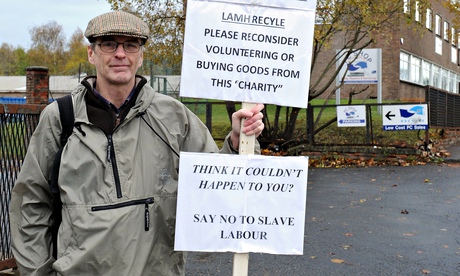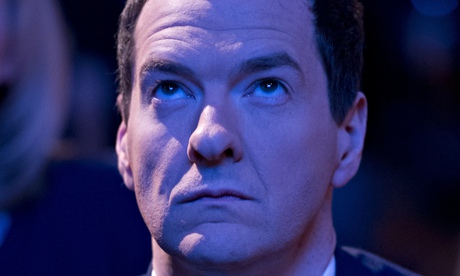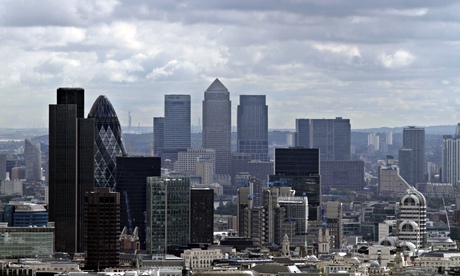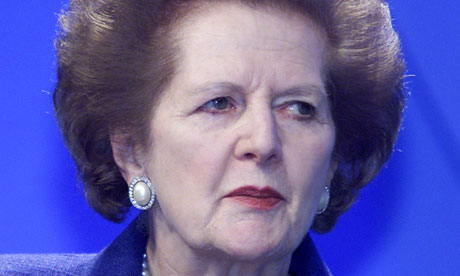John McArthur is sanctioned by jobcentre after refusing ‘forced labour’ at firm where he was previously paid minimum wage

A man who was let go at the end of a temporary job has been ordered by the Department for Work and Pensions (DWP) to work for the same firm for six months without pay.
Electronics specialist John McArthur, now unemployed, says he is living off 16p tins of spaghetti and without heating after being sanctioned by a jobcentre for refusing to work unpaid for LAMH Recycle in Motherwell, a Scottish social enterprise.
He says he was happy to work for LAMH under the now-defunct future jobs fund for the minimum wage in 2010-2011, but refuses on principle to do the same job unpaid.
McArthur, 59, says he is surviving on a monthly pension of £149 after the DWP stopped his unemployment benefit until January as punishment for his refusal to go on the 26-week community work placement (CWP).
For almost three months, McArthur has spent two hours each weekday morning parading outside the plant wearing a placard reading: “Say no to slave labour”.
“It was simply a case of: ‘Go here, work for nothing and if you don’t we’ll stop your subsistence level benefit,’” he said.
McArthur, who says he has been applying for 50 jobs a week without joy, said the CWP programme was “entirely exploitative” and came at the “expense of poor people who’ve got absolutely no choice”. He added: “They [the government] deny it’s forced labour, that you can say no, but forced doesn’t always mean physical, it can be psychological or economic.
“The person who is trying to survive already on subsistence level welfare has absolutely no choice in the matter … especially if they’ve got young children to look after.”
LAMH confirmed it has 16 people working for six months without pay under CWP but added that since the end of June, six had progressed into paid employment.
The social enterprise, which repairs computers and recycles tin and cardboard, says it helps dozens of people each year who are long-term unemployed, many of whom have health issues.
Joe Fulton, the operations and development manager, said he believed the scheme “worked for people who want to make it work for them”. He added that out of the organisation’s paid workforce of 39, 25 had previously been unemployed.
McArthur said there were no jobs for someone his age in the Lanarkshire area. He said support for his placard demonstration had been overwhelming and just one person had objected.
Following conversations with local councillors, North Lanarkshire council passed a motion in October strongly objecting to forced employment schemes saying it would not get involved itself. “This council will not provide jobs or placements without pay as a condition of receiving benefits unless it is truly voluntary,” the motion read.
“We do not support any mandation of unemployed people to work without pay that puts their benefits at risk.”
The motion added such measures were ineffective and could “further stigmatise and demotivate” the unemployed in their search for work.
Last Wednesday, the DWP continued to battle the information commissioner and hostile court judgments ordering it to reveal where possibly hundreds of thousands of people are being sent to work without pay, sometimes for months at a time.
At the tribunal, the DWP argued that if the public knew exactly where people were being sent on placements political protests would increase, which was likely to lead to the collapse of several employment schemes and undermine the government’s economic interests.
The DWP confirmed some of the UK’s biggest charities, including the British Heart Foundation, Scope, Banardo’s, Sue Ryder, and Marie Curie had withdrawn from the CWP scheme, causing a significant loss of placements.
Giving evidence, senior civil servant Jennifer Bradley confirmed that numerous charities and businesses were receiving cash payments as an incentive to take on the unemployed.
She said several DWP schemes used mandatory unpaid work as a tool to help people but stressed that it was written into the terms that charities and businesses could not use people out of work to replace their paid workforce.
The DWP said it could not comment on individual cases but added that community work placements “help long-term unemployed people to gain work experience which increases their confidence, helps them to gain vital skills and crucially, improves their chances of getting a job.
“We are not naming the charities and community groups involved in the scheme in order to protect them from those who seem intent on stopping us helping people into work.”








